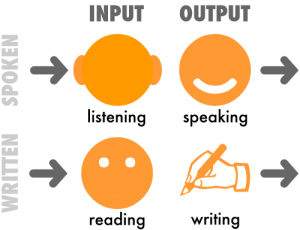 Some aspects of learning a language are daunting, and may seem difficult to overcome. Time and patience are the basic things and some activities for learning the new language should be carried out to overcome these challenges. In this article, we will discuss the activities and the basic skills for learning a new language, and you would find them effectual. Build them as your regular study program.
Some aspects of learning a language are daunting, and may seem difficult to overcome. Time and patience are the basic things and some activities for learning the new language should be carried out to overcome these challenges. In this article, we will discuss the activities and the basic skills for learning a new language, and you would find them effectual. Build them as your regular study program.
Listening
- For developing your listening strategies, use an audio or a video to practice and learn. Listen to one thing not only once or twice, but several times. This helps in building an understanding of a piece by listening to it several times.
- Try to focus on the pronunciation and note how the preceding words influence the pronunciation of the following. Listen to more than two sentences giving the same meaning, and identify the difference or the variation in the same.
- Using video recordings for listening helps you in developing skills to interpret paralinguistic clues, like head and eye movement, gestures, etc. for improving your understanding of the context.
- It is a good idea to listen to a recording with someone else, so that after each listening you can share information on what you both have understood.
- Use a short section of the recording as a self dictation exercise and practice other skills along with listening – taking down notes and then writing a short summary. Moreover, you can extract useful vocabulary.
Reading
- Developing your skills in predicting – see what you can predict about the text from the title, side headings, the first or the last paragraph. Thus, ask yourself what the article is all about.
- Improving your skills in making inferences. From a piece of text, try to guess the meaning of difficult words. For instance, what speech it is, what the following and preceding information suggests may lead to finding the meaning of the unknown word.
- For clarity, try to break the sentences and rephrase the ideas in simple terms.
- Develop text awareness skills. Go through the text and try to identify the writer’s attitude towards the subject and what clues in the text leads you to your conclusion.
Speaking
- Speak new words in order to memorize and also practice the pronunciation.
- Ask the native speakers to check how you are pronouncing different words.
- Find opportunities to speak and practice because this helps in developing fluency in the language.
- It is a good idea for recording yourself on tape, replaying and finding the mistakes in grammar, vocabulary, pronunciation, and later correcting it and saying it a better way next time.
- Practice mimicking the native speakers, which helps you in developing confidence.
Writing
- racticing writing is a good way of improving and learning a new language. Even informal writing activities like writing a diary entry in the language you are learning, corresponding with the native speaker on email, etc. are useful.
- When writing/typing on word program, use a spell checker to monitor your mistakes. In addition, note the words with the same spellings but different meaning. Such words may confuse you. For example, quiet and quite. Another essential tool for checking similar word is looking up a thesaurus.
The ways discussed here are likely to help you learn the language with sustained practice over time.